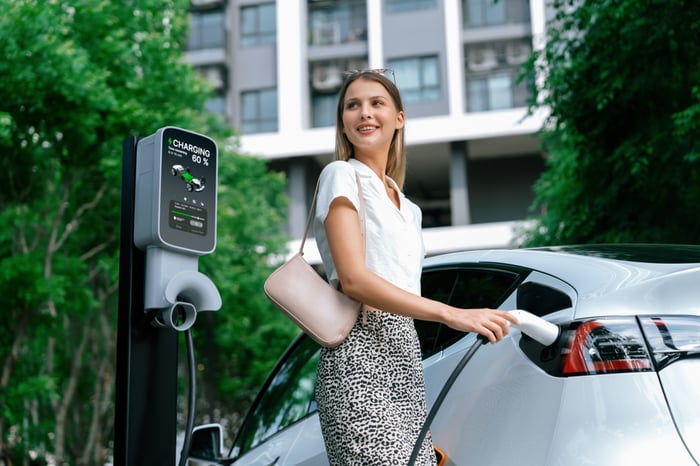Tesla has been the EV market leader, but Rivian has a big opportunity with the R2.
Tesla (TSLA 6.18%) has dominated the electric vehicle (EV) market for over a decade, but the company’s core business has begun to struggle. Rivian Automotive (RIVN 7.80%), meanwhile, is still in the early innings as an automaker, but is starting to hit important milestones.
Both stocks come with risk, but one has a much better setup for investors right now.
Rivian’s R2 opportunity
Rivian slipped back into negative gross margins in Q2 after two straight positive quarters, with higher material costs due to supply constraints and new tariffs taking their toll. The loss of the federal $7,500 EV tax credit this fall will be another drag. Those are real headwinds, but they don’t take away from the progress that Rivian has been making.
Building out a profitable EV business is not easy, with even major automakers often struggling to sell their EV models for a profit. However, Rivian took a big step in this direction when it switched to a zonal architecture. This slashed the number of electronic control units and wiring in its vehicles, making its SUVs cheaper to build. It also helped the company secure a major partnership with Volkswagen, which opened up its checkbook to gain access to the technology and form a joint venture.
The next big step for Rivian will be launching its new, smaller R2 SUV next year. At a starting price of around $45,000, it will target a much broader audience than the R1 luxury line, which costs over $100,000 for some versions. Importantly, Rivian has locked in costs through supplier contracts and expects the R2 to deliver stronger margins through lower material costs, higher volumes, and shared fixed expenses with its R1 and electric delivery van lines.
On the financial front, Rivian is backed by Amazon, which uses its delivery vans, and it still has more cash coming from Volkswagen if and when certain milestones are reached. It has also secured a $6.6 billion loan from the Department of Energy to help build a second U.S. plant. With $7.5 billion in cash and short-term investments, the company has plenty of capital to support the R2 launch. Management is targeting earnings before interest, taxes, depreciation, and amortization (EBITDA) breakeven by 2027, which seems like a realistic timeline if the R2 is successful.
Rivian is still a high-risk name, but it has the balance sheet, the partners, and the right vehicle strategy to grow into a profitable business.
Tesla is losing momentum
Tesla’s core auto business has been heading in the wrong direction. Deliveries dropped double digits in each of the past two quarters, while auto revenue slid 16% in Q2. Profitability and cash flow have also taken a hit. Adjusted EPS dropped 23% last quarter, while operating cash flow fell 30% and free cash flow collapsed to just $146 million.
Meanwhile, its high gross margin regulatory credit sales were cut by more than half during the quarter. Musk has already warned investors that things could get worse once the EV tax credit disappears later this year.
Rather than focusing on improving its ailing auto business, Musk has instead continued to try to sell investors on Tesla’s autonomous driving and robotics ambitions. The company has launched a small pilot robotaxi program in Austin, Texas, but the service is limited to a geofenced area and requires a Tesla employee as a safety driver. It’s also already drawn scrutiny from local officials after several safety incidents.
Tesla is promising a rapid rollout of robotaxis across half the U.S. by year-end pending regulatory approvals, but the technology does not appear ready. Its decision to eschew lidar technology and use a camera-only approach remains controversial. This design saves costs, but the technology has struggled in some complex driving conditions, leading to questions around the safety of its approach. By comparison, Alphabet’s Waymo robotaxi is far ahead, with years of experience operating paid, driverless rides in multiple cities.
Image source: Getty Images.
Which EV stock wins?
Both Tesla and Rivian stocks carry their fair share of risk. Rivian is still unprofitable and faces near-term headwinds from tariffs and the loss of EV tax credits. Tesla, however, has a weakening auto business, a valuation that assumes big success in robotaxis and robotics, and a CEO whose actions have hurt the brand with many consumers.
Between the two, Rivian looks like the better investment. The company is improving its cost structure, expanding its market with the R2 SUV, and has the support of well-financed partners to help fund its growth. Tesla’s stock, by contrast, is still priced as if its autonomous driving and robotics bets will pay off, even though it has yet to prove they can.
For investors willing to take on risk, Rivian is the better EV stock to own in my view.
